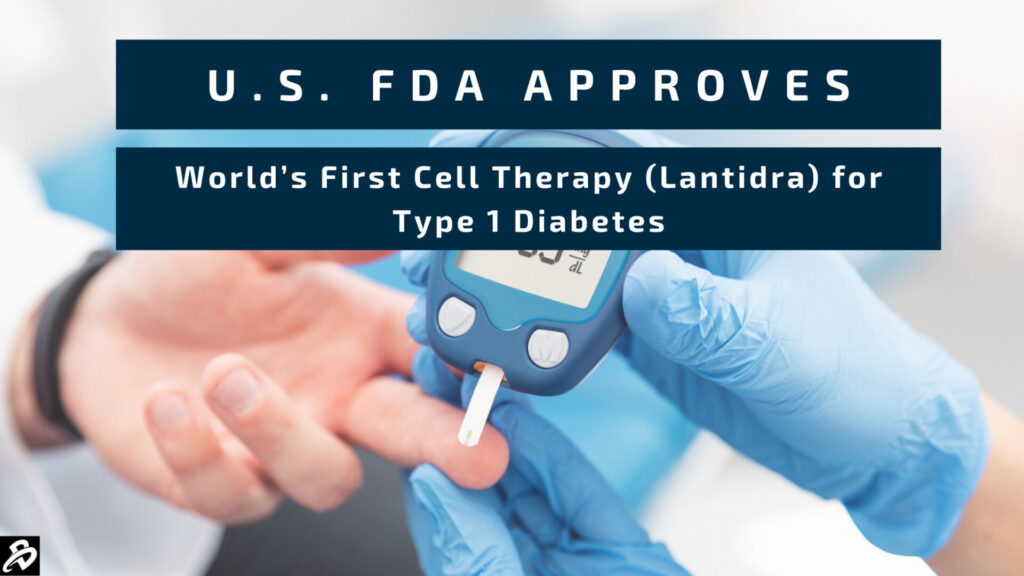A historic milestone was set on June 28, 2023, when the U.S. Food and Drug Administration (FDA) granted approval for Lantidra to CellTrans, Inc., a company headquartered in Chicago, Illinois. Lantidra is a groundbreaking allogeneic pancreatic islet cellular therapy derived from the pancreatic cells of deceased donors. This landmark decision made it the world’s first cellular therapeutic to be approved for the treatment of type 1 diabetes, a disease that does not yet have a permanent treatment option. Lantridra is designed specifically for adults who have difficulty achieving target glycated hemoglobin levels due to recurring episodes of severe hypoglycemia.
Severe hypoglycemia poses a serious threat, often resulting in loss of consciousness or seizures. Dr. Peter Marks, Director of the FDA’s Center for Biologics Evaluation and Research, highlighted the critical nature of this approval, emphasizing that it introduces a groundbreaking avenue for individuals grappling with type 1 diabetes and recurrent severe hypoglycemia to better manage their blood glucose levels and enhance their quality of life.
Type 1 diabetes is a chronic autoimmune disorder demanding ongoing care, typically involving the administration of insulin either via multiple daily injections or continuous infusion pumps. Regular blood glucose monitoring is also a necessity to steer diabetes management in the right direction.
However, managing insulin dosage can prove to be a complex task for some individuals with type 1 diabetes. Striking the balance between avoiding hyperglycemia and preventing hypoglycemia can be elusive. Additionally, the development of hypoglycemia unawareness, where one is unable to sense plummeting blood glucose levels, can further complicate matters. Lantidra emerges as a promising solution for this subset of patients, offering a potential pathway to alleviate their struggles.
Lantidra, the World’s First Cell Therapy for Type 1 Diabetes
Lantidra’s primary mode of action hinges on the insulin secretion facilitated by the introduced allogeneic islet beta cells. In certain cases, these infused cells exhibit the capacity to produce adequate insulin, negating the need for external insulin administration through injections or pumps. The administration of Lantidra entails a single infusion into the hepatic portal vein, and subsequent infusions may be considered based on individual response.
The safety and effectiveness of Lantidra were rigorously assessed through two non-randomized, single-arm studies involving 30 participants with type 1 diabetes and hypoglycemic unawareness. Encouragingly, 21 participants achieved extended periods of insulin independence, spanning from one year to over five years, with some entirely eliminating the need for insulin.
It’s worth noting that the spectrum of adverse reactions linked to Lantidra varied based on the number of infusions and the duration of follow-up. Common adverse effects included nausea, fatigue, anemia, diarrhea, and abdominal pain. A notable proportion of participants experienced serious adverse reactions tied to the infusion procedure and the use of immunosuppressive medications, which are essential to maintain islet cell viability. In certain instances, discontinuation of these medications led to compromised islet cell function and loss of insulin independence. These potential adverse events should be carefully weighed against the benefits when evaluating Lantidra’s suitability for individual patients.
The FDA has granted Lantidra its seal of approval, with accompanying patient-directed information outlining both its benefits and associated risks. This landmark approval was awarded to CellTrans Inc., underscoring the agency’s commitment to safeguarding public health through ensuring the safety and efficacy of diverse medical products, from drugs and vaccines to medical devices, thereby maintaining the well-being of the population.
To learn more, view the original FDA announcement here.
